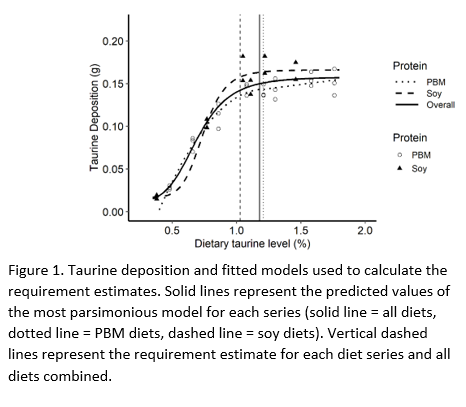A COMPARISON OF GROWTH AND TAURINE RETENTION BETWEEN PLANT AND ANIMAL PROTEIN-BASED DIETS IN JUVENILE WHITE SEABASS Atractoscion nobilis
A 70-day trial was conducted to evaluate the effect of dietary protein matrix (soybean meal or poultry byproduct meal-PBM) on taurine efficacy and retention in juvenile white seabass Atractoscion nobilis. Diets were formulated to contain 40% protein and 12% lipids with taurine supplementation ranging from 0 - 1.37% taurine. Fish were fed 4-8% body weight/day over the course of the trial. Growth performance metrics and taurine retention in fish were measured and compared using a linear regression model with diet type as covariates (growth parameters) or a quadratic model with diet type as covariates (taurine retention and deposition). Fish fed diets with soy proteins had lower percent gain, survival, feed fed/fish, and thermal-unit growth coefficients (TGC) at similar levels of taurine inclusion when compared to diets with primarily PBM as the protein source. Taurine level was positively correlated with mean final weight, weight gain, percent gain, TGC of fish regardless of diet, and negatively correlated with FCR regardless of the diet. A taurine requirement based on whole-body deposition was calculated to be 1.18%, 1.21%, and 1.03% for all diets, PBM diets, and soy diets, respectively (Figure 1). The 95% confidence intervals for the taurine requirement estimates all overlap, so there is no statistical difference in the estimates. These results demonstrate that the protein source did not influence the taurine requirement and suggest that taurine deficiencies are not the driver of lower TGC or survival in white seabass fed diets with soy, and that other factors warrant investigation
